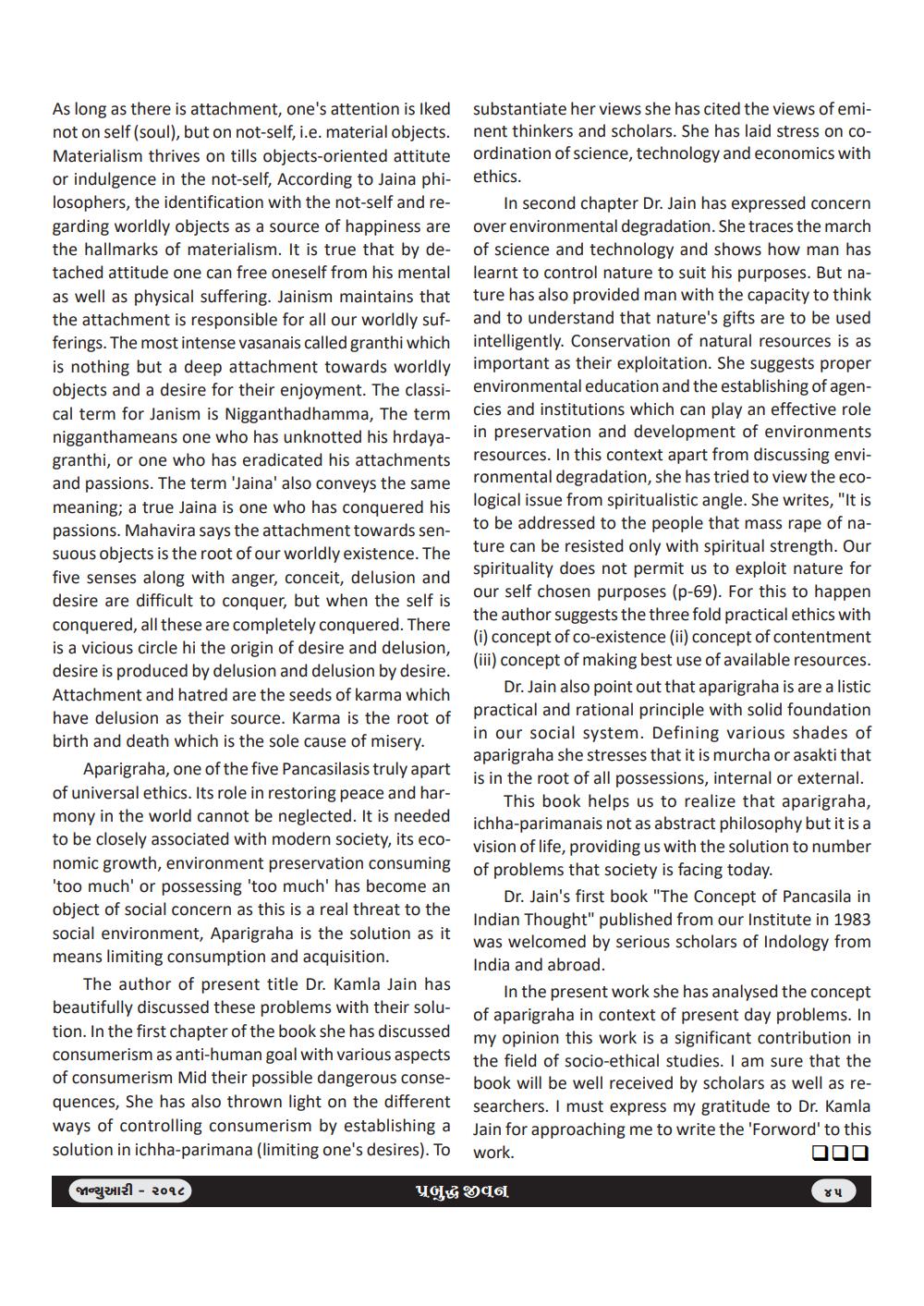________________
As long as there is attachment, one's attention is Iked not on self (soul), but on not-self, i.e. material objects. Materialism thrives on tills objects-oriented attitute or indulgence in the not-self, According to Jaina phi- losophers, the identification with the not-self and re- garding worldly objects as a source of happiness are the hallmarks of materialism. It is true that by de- tached attitude one can free oneself from his mental as well as physical suffering. Jainism maintains that the attachment is responsible for all our worldly suf- ferings. The most intense vasanais called granthi which is nothing but a deep attachment towards worldly objects and a desire for their enjoyment. The classi- cal term for Janism is Nigganthadhamma, The term nigganthameans one who has unknotted his hrdaya granthi, or one who has eradicated his attachments and passions. The term 'Jaina' also conveys the same meaning; a true Jaina is one who has conquered his passions. Mahavira says the attachment towards sensuous objects is the root of our worldly existence. The five senses along with anger, conceit, delusion and desire are difficult to conquer, but when the self is conquered, all these are completely conquered. There is a vicious circle hi the origin of desire and delusion, desire is produced by delusion and delusion by desire. Attachment and hatred are the seeds of karma which have delusion as their source. Karma is the root of birth and death which is the sole cause of misery.
Aparigraha, one of the five Pancasilasis truly apart of universal ethics. Its role in restoring peace and harmony in the world cannot be neglected. It is needed to be closely associated with modern society, its economic growth, environment preservation consuming 'too much' or possessing 'too much' has become an object of social concern as this is a real threat to the social environment, Aparigraha is the solution as it means limiting consumption and acquisition.
The author of present title Dr. Kamla Jain has beautifully discussed these problems with their solution. In the first chapter of the book she has discussed consumerism as anti-human goal with various aspects of consumerism Mid their possible dangerous consequences, She has also thrown light on the different ways of controlling consumerism by establishing a solution in ichha-parimana (limiting one's desires). To
substantiate her views she has cited the views of eminent thinkers and scholars. She has laid stress on coordination of science, technology and economics with ethics.
In second chapter Dr. Jain has expressed concern over environmental degradation. She traces the march of science and technology and shows how man has learnt to control nature to suit his purposes. But nature has also provided man with the capacity to think and to understand that nature's gifts are to be used intelligently. Conservation of natural resources is as important as their exploitation. She suggests proper environmental education and the establishing of agencies and institutions which can play an effective role in preservation and development of environments resources. In this context apart from discussing environmental degradation, she has tried to view the ecological issue from spiritualistic angle. She writes, "It is to be addressed to the people that mass rape of nature can be resisted only with spiritual strength. Our spirituality does not permit us to exploit nature for our self chosen purposes (p-69). For this to happen the author suggests the three fold practical ethics with (i) concept of co-existence (ii) concept of contentment (iii) concept of making best use of available resources.
Dr. Jain also point out that aparigraha is are a listic practical and rational principle with solid foundation in our social system. Defining various shades of aparigraha she stresses that it is murcha or asakti that is in the root of all possessions, internal or external.
This book helps us to realize that aparigraha, ichha-parimanais not as abstract philosophy but it is a vision of life, providing us with the solution to number of problems that society is facing today.
Dr. Jain's first book "The Concept of Pancasila in Indian Thought" published from our Institute in 1983 was welcomed by serious scholars of Indology from India and abroad.
In the present work she has analysed the concept of aparigraha in context of present day problems. In my opinion this work is a significant contribution in the field of socio-ethical studies. I am sure that the book will be well received by scholars as well as researchers. I must express my gratitude to Dr. Kamla Jain for approaching me to write the 'Forword' to this work.
DO
(જાન્યુઆરી - ૨૦૧૮
પ્રબુદ્ધ જીવળ
૪૫.




